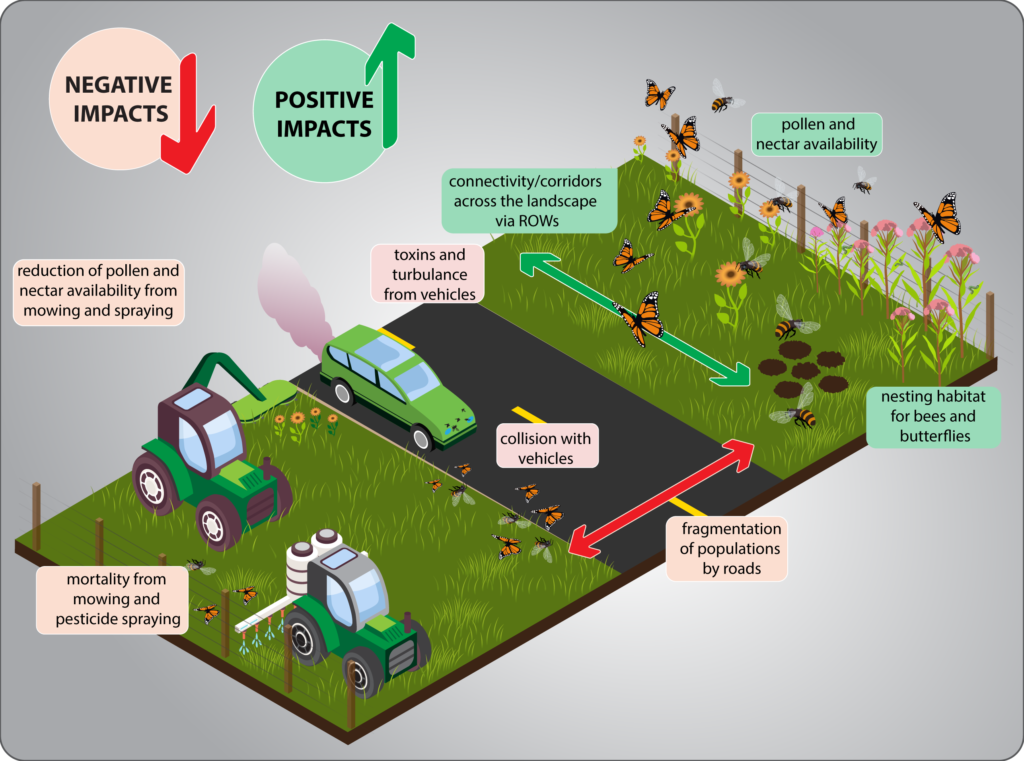MSU Graduate Investigates Presence of Monarch Butterflies and Other Pollinators in Roadside Habitats

Monarch butterflies (Danaus plexippus), the striking and iconic orange and black insects of postcards and motivational posters, have been in population decline since the 1980s and Thomas Meinzen, a master’s student in Montana State University’s Ecology Department, turned to a largely overlooked environment to save them. His thesis, Bees and Butterflies in Roadside Habitats: Identifying […]
New Project: Conserving Monarch Butterfly Habitats Along Idaho Highways

Researchers from the Montana State University Ecology Department and WTI’s Road Ecology program will investigate the roadside habitats of monarch butterflies in Idaho, as part of a new project for the Idaho Transportation Department (ITD). The monarch butterfly population has declined drastically in western states since the 1980s, largely due to habitat loss and fragmentation. […]
Blanketing the Roadsides: Wool Erosion Control Blankets Nurture Revegetation
MSU News is highlighting a successful collaboration between WTI and the Montana Department of Transportation (MDT) to use blankets made of Montana wool to prevent erosion and promote plant growth along highways. For a recent feature article, Principal Investigator Rob Ament invited MSU news staff to visit the test site along Highway 287 near Three […]
New Paper Released: Environmental challenges for the Belt and Road Initiative
WTI Researcher Tony Clevenger was co author on a recently released paper, “Environmental challenges for the Belt and Road Initiative.” The Belt and Road Initiative will greatly influence the future of global trade. However, it may also promote permanent environmental degradation. We call for rigorous strategic environmental and social assessments, raising the bar for environmental […]
Rob Ament to lead webinar on woolen erosion control products (March 29)
On Thursday, March 29, Road Ecology Program Manager Rob Ament will lead a webinar entitled “Evaluation of Effectiveness and Cost-Benefits of Woolen Roadside Reclamation Products” for the Center for Environmentally Sustainable Transportation in Cold Climates (CESTiCC) at the University of Alaska, Fairbanks. The presentation will focus on Rob’s research, which took a fresh look at […]
Two New Research Reports Released: Wool Reclamation Products and High Performance Concrete
The Montana Department of Transportation has released the final reports for two projects by WTI researchers: “Evaluation of Effectiveness and Cost-Benefits of Woolen Roadside Reclamation Products.” This research project developed three types of products for study: woolen erosion control blankets (ECBs), wool incorporated into wood fiber compost, and wool incorporated into silt fence. The project, […]
Native plants for roadside revegetation in Idaho
Road Ecology Program Manager Rob Ament and colleagues in the MSU Department of Land Resources and Environmental Sciences will have an article published in the Spring 2017 edition of Native Plants Journal. “Native plants for roadside revegetation in Idaho” documents their field study to evaluate the success of sustainable roadside revegetation strategies on 16 sites in Idaho. Citation: Ament, […]
Wool Blankets for Erosion Control: Research Highlighted in International Publication
Environmental Connection, the magazine of the International Erosion Control Association, published a feature article about Rob Ament’s wool research in its July 2017 issue. “Bullish for Wool: Using Wool in Erosion Control Blankets Shows Promising Results in Montana Study” summarizes the results of a WTI project funded by the Montana Department of Transportation (MDT) and […]
MSU Extension Highlights Roadside Vegetation Research
Using native plants for roadside revegetation is the lead story in the “Weed Post,” a monthly newsletter by the Montana State University Extension Office and the Montana Noxious Weed Education Campaign. The article describes successful research by Rob Ament (WTI), Monica Pokorny (Natural Resources Conservation Service), Noelle Orloff (MSU) and Jane Mangold (MSU), which demonstrated that establishing […]
Rob Ament’s work featured on MSU News
WTI’s Rob Ament interviewed by MSU News Service about roadside vegetation carbon sequestration. “MSU biologist says plants growing along roadways capture carbon, help mitigate auto emissions.“
